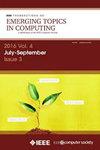多核信息物理系统中不完全故障检测的动态任务复制
IF 5.4
2区 计算机科学
Q1 COMPUTER SCIENCE, INFORMATION SYSTEMS
IEEE Transactions on Emerging Topics in Computing
Pub Date : 2025-03-28
DOI:10.1109/TETC.2025.3572277
引用次数: 0
摘要
任务复制是实现容错的常用技术。然而,其有效性受到故障检测机制准确性的限制;不完善的检测对可实现的可靠性造成了限制。虽然完美的故障检测机制提供了更高的可靠性,但它们带来了巨大的开销。为了解决这个问题,我们引入了动态任务复制,这是一种容错技术,可以在运行时动态确定副本的数量,以克服不完全故障检测的限制。我们的主要贡献,可靠性感知副本-高效动态任务复制,通过最小化预期副本数量,同时达到期望的可靠性目标,优化了这种方法。我们将实际执行时间纳入可靠性评估。此外,我们提出了能量感知可靠性保证调度技术,该技术将我们优化的复制方法集成到硬实时系统中,并利用动态电压和频率缩放来最大限度地减少能源消耗,同时确保可靠性和系统可调度性。实验结果表明,我们的方法比n模冗余技术平均减少24%的副本,对于低基础可靠性的任务,优势增加到58%。此外,与现有方法相比,我们的调度技术在不同系统工作负载下显着节省了能源并提高了可行性。本文章由计算机程序翻译,如有差异,请以英文原文为准。
Dynamic Task Replication With Imperfect Fault Detection in Multicore Cyber-Physical Systems
Task replication is a common technique for achieving fault tolerance. However, its effectiveness is limited by the accuracy of the fault detection mechanism; imperfect detection imposes a ceiling on achievable reliability. While perfect fault detection mechanisms offer higher reliability, they introduce significant overhead. To address this, we introduce Dynamic Task Replication, a fault tolerance technique that dynamically determines the number of replicas at runtime to overcome the limitations of imperfect fault detection. Our primary contribution, Reliability-Aware Replica-Efficient Dynamic Task Replication, optimizes this approach by minimizing the expected number of replicas while achieving the desired reliability target. We incorporate actual execution times into the reliability assessment. Additionally, we propose the Energy-Aware Reliability-Guaranteeing scheduling technique, which integrates our optimized replication method into hard real-time systems and leverages Dynamic Voltage and Frequency Scaling to minimize energy consumption while ensuring reliability and system schedulability. Experimental results demonstrate that our method requires 24% fewer replicas on average than the N-Modular Redundancy technique, with the advantage increasing to 58% for tasks with low base reliabilities. Furthermore, our scheduling technique significantly conserves energy and enhances feasibility compared to existing methods across diverse system workloads.
求助全文
通过发布文献求助,成功后即可免费获取论文全文。
去求助
来源期刊

IEEE Transactions on Emerging Topics in Computing
Computer Science-Computer Science (miscellaneous)
CiteScore
12.10
自引率
5.10%
发文量
113
期刊介绍:
IEEE Transactions on Emerging Topics in Computing publishes papers on emerging aspects of computer science, computing technology, and computing applications not currently covered by other IEEE Computer Society Transactions. Some examples of emerging topics in computing include: IT for Green, Synthetic and organic computing structures and systems, Advanced analytics, Social/occupational computing, Location-based/client computer systems, Morphic computer design, Electronic game systems, & Health-care IT.
 求助内容:
求助内容: 应助结果提醒方式:
应助结果提醒方式:


